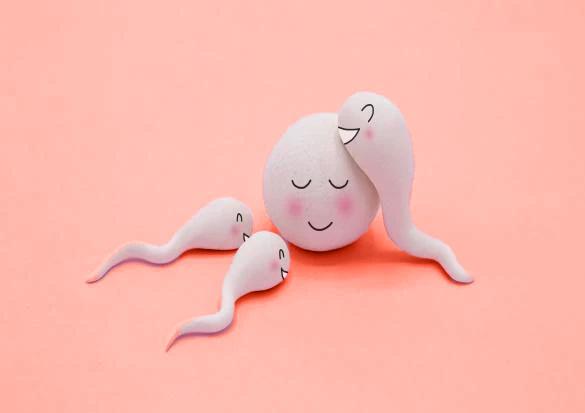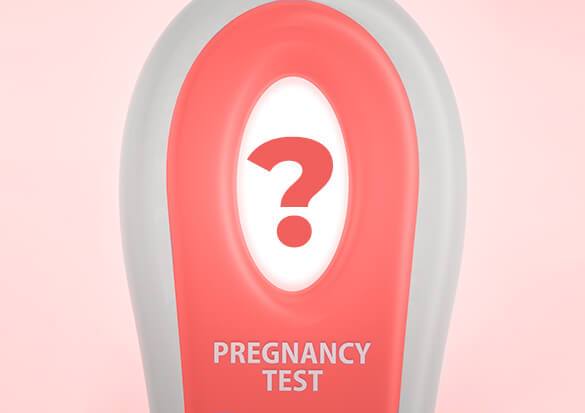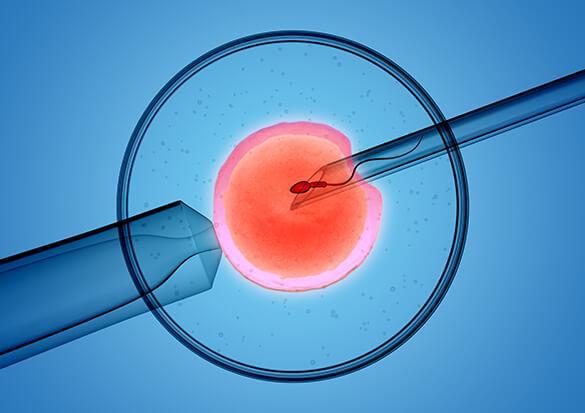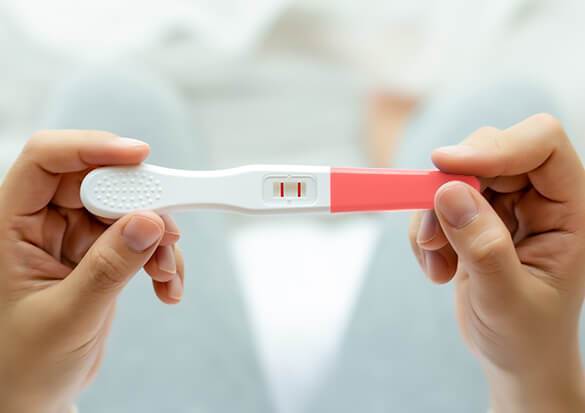Top 10 common fertility myths
Take a look at the ten most common fertility myths, where we give you the honest answers - backed by professionals.
We know that certain lifestyle factors can impact fertility, like getting the right nutrients or avoiding toxins. But is the key to getting pregnant really relaxing? Or are you struggling because of your genes?
With as many as one in seven couples experiencing a fertility concern, we discuss the ten most common myths below, giving you honest answers – backed by science.
Top ten fertility myths
1. Infertility is a woman’s problem
Infertility affects both men and women equally [1]. Approximately 25% of infertility relates to the male partner, 25% relates to the female partner, 25% is a combination of both male and female, and 25% relates to an unknown cause.
Several underlying conditions can cause male and female infertility and you can read more about them on the main causes of female infertility and male infertility pages.
2. Just relax, and you’ll get pregnant
Being told to relax can be extremely upsetting if you are struggling to conceive. Though it’s proven that stress can impact how quickly you conceive [2], infertility is a medical condition, and often there is a physical reason why you have not yet been able to start a family.
One in seven couples are affected by infertility and it is not uncommon. You can read more about infertility and how lifestyle changes can help optimise your chances of getting pregnant in our Fertility Guide.
3. Fertility drops off a cliff at 35
Yes and no – there is no denying biology, and that you are more fertile in your teens and twenties. However, it is your ovarian reserve that matters. Ovarian reserve refers to the reproductive potential left within a woman’s ovaries, based on the number and quality of eggs [3]. Ovarian reserve can be considered as part of the biological clock, though the clock can vary from woman to woman.
Some women can go on conceiving in their late 30s and 40s, but as both egg and sperm quality can reduce as you get older, it can be more difficult for couples to conceive later in life.
It is recommended that you don’t wait until your late 30s before trying to conceive, as it is more likely that you will struggle and require fertility treatments.
4. Complementary therapies are an effective fertility treatment
Complementary and alternative therapies may be suggested to people undergoing fertility treatment to help with relaxation or general wellbeing [4].
Complementary therapies are therapies that fall outside of mainstream healthcare such as acupuncture or reflexology. Unfortunately, there is no evidence to suggest that using complementary therapies alone can help you conceive. However, used in conjunction with your fertility treatment, it may have a positive impact if it reduces stress and increases relaxation.
5. IVF will fix it
Though IVF helps many couples on their fertility journey, it still has high failure rates and shouldn’t be considered as a fix-all solution. The success rates with one IVF cycle are very low, with young healthy couples usually only having around a 20% chance of conception [5].
You can read more about fertility treatments such as IVF, in what treatments can help me conceive.
6. If you have one child, there’s a guarantee you can have another one
Having had a previous successful pregnancy does not guarantee that it will happen again the second time around. Secondary infertility is very common and can be very frustrating for couples who are trying to conceive a sibling.
You can read more information on secondary infertility and where to get support if you’re struggling with the effects, in our section on: what is infertility?
7. It’s fine to smoke when you’re trying to conceive, but you need to stop once pregnant
Smoking is a damaging lifestyle factor when it comes to eggs and sperm. You are less likely to conceive if either of you smokes.
A study that investigated lifestyle factors and reproductive health, found that women who smoked zero to ten cigarettes per day had a 52.2% rate of pregnancy compared to women who smoked ten or more cigarettes each day, who had a 34.1% rate of pregnancy [6].
Couples who are trying to conceive should consider giving up smoking before they try to get pregnant, to optimise their chances. You can read more about how to stop smoking and ways to get help on the NHS website.
You can also read about lifestyle changes that can help optimise your chances of getting pregnant on our how can I increase my chances of conception? page.
8. Miscarriages run in families
Though some studies have suggested that recurrent miscarriages might run in families [7], it doesn’t mean that your risk of miscarriage is necessarily any higher than average.
Miscarriages are very common. In 2019, an estimated one in five pregnancies ended in miscarriage in the UK [8]. Most of the causes of a miscarriage are unknown, though certain risk factors can increase your risk.
The good news is that most couples who have experienced a miscarriage will go on to conceive a healthy baby. You can read more information on miscarriages on Tommy’s website.
9. Taking contraception can make it difficult to conceive in the future
Although some methods of contraception like the combined oral contraceptive pill, or the injection, may delay your fertility for a few months, they do not make future conception more difficult.
A three-year study found that long-term use of oral contraceptives did not affect the ability to have children in the future. On the contrary, people who had used combined birth control pills for more than two years were found to be more fertile than those who had used them for less time [9].
10. It won’t make a difference if I lose weight
Being overweight can sometimes make it more difficult for you to conceive, especially if your weight gain is stopping you from ovulating. Being overweight also increases your likelihood of having a miscarriage.
Losing just a small percentage of your body weight can make a considerable difference to your fertility. Equally, if your weight is too low, this can also make it more difficult for you to conceive.
Having a healthy Body Mass Index (BMI) increases your likelihood of conceiving and having a healthy pregnancy [10].
Fertility buying guide
If you’re trying to pregnant, and it’s not happening as quickly as you’d hoped, you’re not alone. We understand that trying to fall pregnant can be a stressful time for some couples so, to take the confusion out of finding the right test to investigate your or your partner's fertility status, we've created a handy Fertility Blood Test Buying Guide.
Fertility blood tests
Whether you are trying for a baby now or thinking about trying in the future, we have several fertility tests for each stage of your fertility journey.
Have a look at our range of Fertility Blood Tests, or, if you are unsure which test is best for you, go through our handy Fertility Blood Test Buying Guide or test finder.
References
- Infertility (no date) Infertility | Office on Women's Health. Available at: https://www.womenshealth.gov/a-z-topics/infertility (Accessed: November 23, 2022).
- Sanoff, R. (2021) The truth about stress and fertility, Modern Fertility Blog. Modern Fertility Blog. Available at: https://modernfertility.com/blog/stress/#:~:text=Stress%20can%20even%20shut%20down,and%20irregular%20or%20missed%20periods. (Accessed: November 23, 2022).
- England, C.N. (no date) Diminished ovarian reserve, Women & Infants Fertility Center In Rhode Island. Available at: https://fertility.womenandinfants.org/services/women/diminished-ovarian-reserve (Accessed: November 23, 2022).
- Complementary and alternative therapies (no date) HFEA. Available at: https://www.hfea.gov.uk/treatments/complementary-and-alternative-therapies/ (Accessed: November 23, 2022).
- Silvia, P.B.T. (2022) The importance of three full cycles of IVF, Grants for Medical. Available at: https://www.grantsformedical.com/three-full-cycles-of-ivf.html (Accessed: November 23, 2022).
- Sharma, R. et al. (2013) “Lifestyle factors and Reproductive Health: Taking Control of Your Fertility,” Reproductive Biology and Endocrinology, 11(1). Available at: https://doi.org/10.1186/1477-7827-11-66.
- Miskovic, S. et al. (2012) “Positive reproductive family history for spontaneous abortion: Predictor for recurrent miscarriage in young couples,” European Journal of Obstetrics & Gynecology and Reproductive Biology, 161(2), pp. 182–186. Available at: https://doi.org/10.1016/j.ejogrb.2011.12.027.
- Baby Loss Statistics (no date) Tommy's. Together, for every baby. Available at: https://www.tommys.org/baby-loss-support/pregnancy-loss-statistics?gclid=CjwKCAjwkvWKBhB4EiwA-GHjFqat1it34qw6DixaWb0SroAVPa-PPNUV8fCH5dam61nFUr8WhWFmshoCIlgQAvD_BwE (Accessed: November 23, 2022).
- Mikkelsen, E.M. et al. (2013) “Pre-gravid oral contraceptive use and time to pregnancy: A Danish prospective cohort study,” Human Reproduction, 28(5), pp. 1398–1405. Available at: https://doi.org/10.1093/humrep/det023.
- Overweight and fertility when planning a pregnancy (no date) Tommy's. Together, for every baby. Available at: https://www.tommys.org/pregnancy-information/planning-a-pregnancy/are-you-ready-to-conceive/overweight-and-fertility-when-planning-pregnancy (Accessed: November 23, 2022).
Related tests
If you’re hoping to start a family or simply want to understand more about your reproductive health, our Day 3 Fertility Blood Test provides valuable insights into your ovarian reserve and hormone balance
- Results estimated in 2 working days
- 3 biomarkers
Finger-prick or Venous collection
Select testStay on top of your game with our advanced blood test for men
- Results estimated in 3 working days
- 44 biomarkers
Venous collection
Select testTake control of your health with our best-selling female health check
- Results estimated in 3 working days
- 47 biomarkers
Venous collection
Select test






